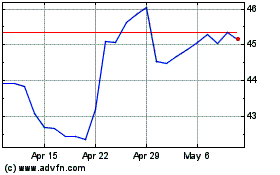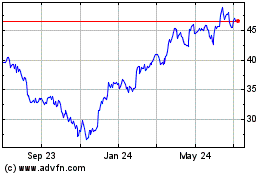GM Aims To Give Electric Vehicle Owners More Places To Charge
July 31 2020 - 2:43PM
Dow Jones News
By Mike Colias
General Motors Co. is working to install 2,700 electric-vehicle
chargers in the U.S., in an effort to stoke demand for
battery-powered cars and catch up with Tesla Inc.'s commanding lead
in the plug-in market.
GM said Friday the so-called fast-charging stations will be able
to replenish about 60 miles of driving range in 20 minutes, similar
to some of the ones used in Tesla's network of more than 17,000
chargers in North America.
GM will invest an undisclosed amount and help charging operator
EVgo to leverage public funding over the next five years in U.S.
metro areas, the companies said.
Over the past five years, auto makers have gradually improved
the range electric vehicles can travel on a single charge, some to
more than 300 miles. But a shortage of charging stations remains an
impediment for consumers.
Outside of Tesla's so-called Supercharger network, the nation's
charging infrastructure is largely a patchwork of systems installed
by small companies and startups. Pricing is often inconsistent and
the upkeep spotty. Drivers at times encounter outdated machines
that provide only a few miles of range for an hour-long charge.
Some car companies, including Volkswagen AG and Ford Motor Co.,
have taken a more active role in building out charging networks.
Many are working on larger, more-powerful electric cars that will
require faster, reliable chargers to replenish their bigger battery
packs.
The chargers will be publicly available to any electric-car
owner and customers typically spend $5 to $15 on a charging
session, GM and EVgo said.
"We believe that charging should be open to everyone," GM Chief
Executive Mary Barra told reporters Friday, adding that more
chargers will encourage electric-vehicle sales.
That contrasts with Tesla, which years ago spent the money to
build out its own charging network for the use of Tesla owners. The
move helped give Tesla an early lead among car companies in
convincing traditional buyers to switch to its plug-in models.
Ms. Barra has pinned GM's growth strategy largely on the notion
that electric vehicles eventually will catch on as prices come down
and it becomes easier for owners to charge them. She is under
pressure to translate her electric-vehicle plans into investor
enthusiasm.
The Detroit auto maker's plan is aimed at supporting its bet on
electric vehicles, which now account for less than 1% of GM's
overall sales. Industrywide, electric vehicles represented about
2.5% of overall sales globally last year, according to research
firm EV Volumes.
GM recently said it is investing $20 billion to develop electric
cars and autonomous-driving technology through 2025. In March,
executives showed analysts and dealers about a dozen future
electric models, ranging from brawny pickup trucks to a sleek
Cadillac.
Still, GM's stock price has languished during the pandemic while
Tesla's has soared, and money has been pouring into
electric-vehicle startups such as Nikola Corp. and privately held
Rivian Automotive.
During a conference call with analysts Wednesday to discuss
second-quarter earnings, Ms. Barra fielded several questions about
how she can leverage GM's electric-vehicle technology. One analyst
asked if GM would consider licensing its batteries or other
components to other auto makers. Another asked whether GM should
consider changing its corporate name to Ultium, the name of the
GM-developed batteries that will power its electric vehicles.
Ms. Barra said she is open to ideas that will boost the stock
price but didn't directly answer the name-change question.
There were about 69,000 publicly available fast chargers in the
U.S. as of May 2019, according to the U.S. Department of Energy. Of
those, only about 11,000 were so-called DC, or direct-charge,
units, which are the fastest, capable of adding up to 80 miles of
range in about 20 minutes. GM said the 2,700 chargers it will
install with EVgo will be direct charge.
Los Angeles-based EVgo has about 800 public fast chargers in 34
states.
The chargers will be installed at grocery stores and other
high-traffic places, which should make it convenient for
electric-vehicle owners who may not have the ability to plug in at
home or work, the companies said.
Ford recently said its working to install 12,000 charging
stations in the U.S. Volkswagen is investing about $2 billion into
charging infrastructure in the U.S., part of its settlement with
U.S. regulators over its diesel-emissions cheating scandal.
Write to Mike Colias at Mike.Colias@wsj.com
(END) Dow Jones Newswires
July 31, 2020 14:28 ET (18:28 GMT)
Copyright (c) 2020 Dow Jones & Company, Inc.
General Motors (NYSE:GM)
Historical Stock Chart
From Mar 2024 to Apr 2024

General Motors (NYSE:GM)
Historical Stock Chart
From Apr 2023 to Apr 2024
